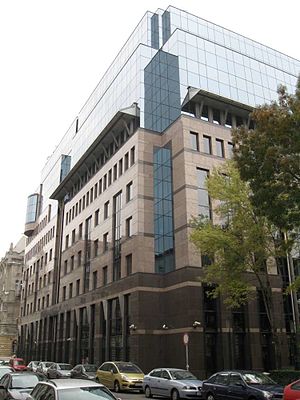Economy of Seketan
 | |
| Currency | Seketese Djev (Đ) |
|---|---|
| Statistics | |
| Population | 6,426,108 (2010) |
| GDP | |
All values, unless otherwise stated, are in US dollars. | |
The economy of Seketan is an upper-middle-income economy. Approximately half of the gross domestic product (GDP) is based in services, supported by strong sectors in energy and resource exploitation. Other important sectors in the economy of Seketan include agriculture and manufacturing of computer parts and machinery.
The services sector plays a pivotal role in Seketan's economy, contributing the largest share to the country's GDP. It encompasses a wide range of industries, including finance, tourism, transportation, information technology, and professional services. The capital city, Conelibek, serves as a major financial hub, hosting national and international banks, investment firms, and insurance companies. The tourism industry has also witnessed growth, attracting visitors with Seketan's natural beauty, cultural heritage, and historical sites.
In the industrial sector, Seketan has harnessed its natural resources and strategic location to develop key industries. The energy sector is of significant importance, with the country rich in energy reserves chiefly in Ellinesa. The mining industry contributes to both domestic consumption and exports, with Seketan extracting minerals and metals such as iron ore, copper, and zinc.
Agriculture remains an essential sector in Seketan, although its contribution to the overall GDP is relatively smaller compared to services and industry. The country benefits from fertile lands in its southern basin, supporting the cultivation of crops such as grains, fruits, vegetables, and livestock.
One of the significant challenges that Seketan faces is corruption, which affects its economic landscape. Corruption undermines governance, distorts market mechanisms, and hampers economic development. It deters both domestic and foreign investments, creates an unfavorable business environment, and diverts resources away from productive sectors. Addressing corruption is crucial for Seketan to unlock its full economic potential, attract investments, and ensure equitable development.